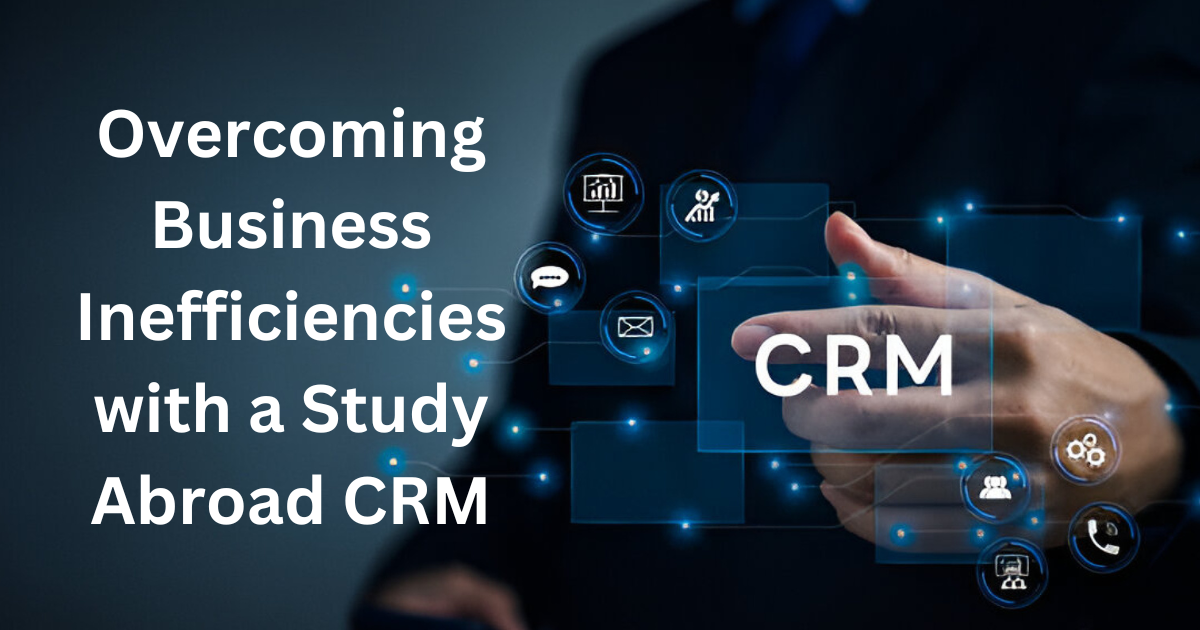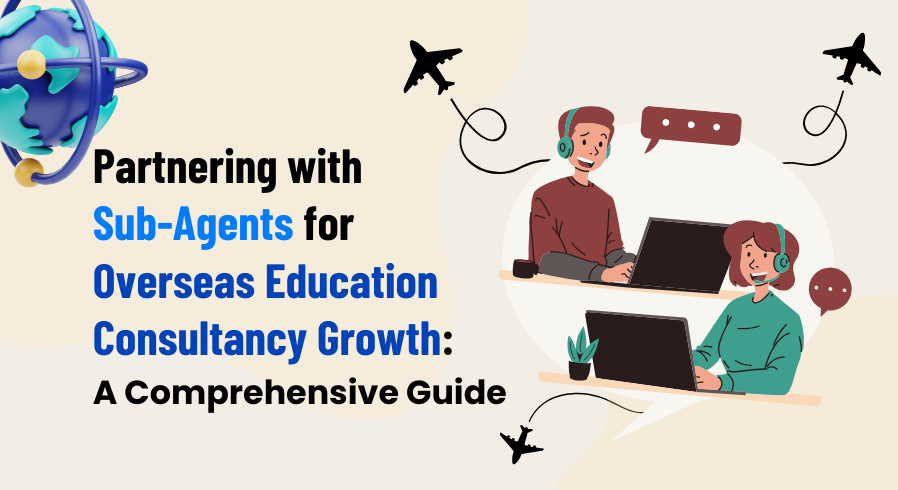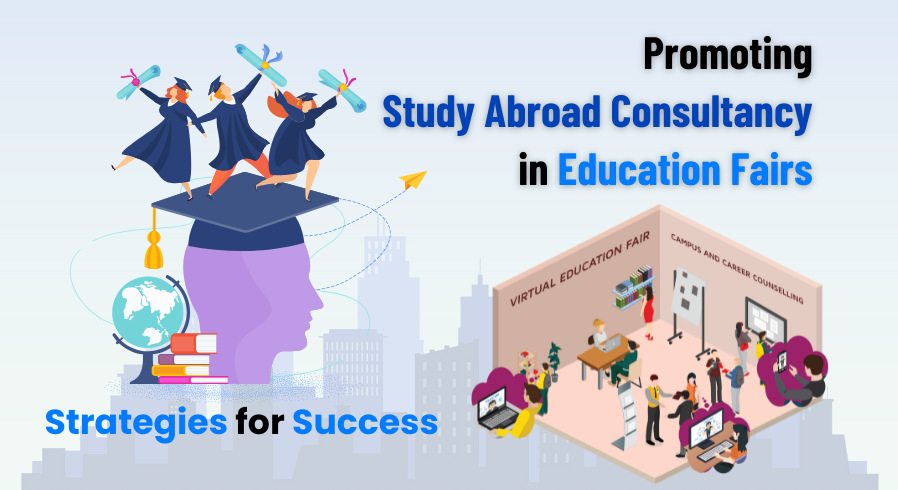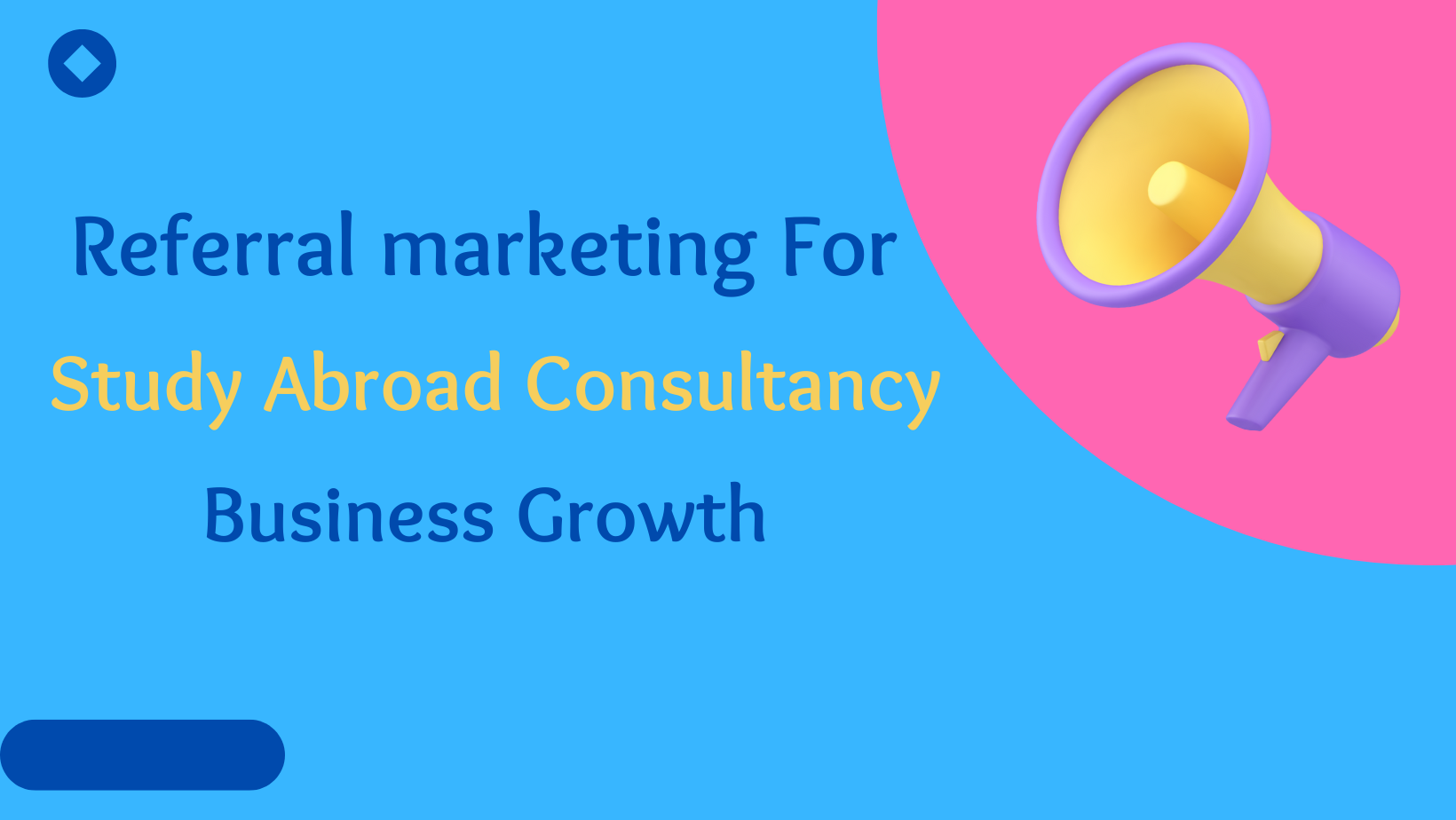Table of Contents

Study abroad consultancies are struggling to manage student inquiries and applications in the current competitive education sector. A Study Abroad Customer Relationship Management (CRM) system can make operations go smoothly, enhance productivity, and enhance the experience for both consultancies and students.
What is a Study Abroad CRM?
A Study Abroad CRM is an education consulting software solution that facilitates students to study abroad. It makes lead management, application tracking, student and university communication, and performance tracking easier. It differs from typical CRMs as it includes application tracking, visa information, and university portal integration.
Lead management – Tracking and organizing student inquiries.
Application tracking – Monitoring students' progress through the application process.
Communication – Ensuring smooth interactions between students, universities, and consultants.
Performance tracking – Measuring consultancy efficiency and student outcomes.
Unlike traditional CRMs, a Study Abroad CRM includes visa processing, application tracking, and university portal integration, making it tailored for international education.
Why Implement a CRM in Education Consultancies?
The study abroad industry is fast-paced, requiring continuous support for students in:
- Choosing the right courses and universities.
- Understanding visa requirements.
- Finding scholarships and funding opportunities.
Managing these tasks manually can lead to errors, inefficiencies, and missed opportunities. A CRM helps by:
- Storing student information for quick access.
- Automating follow-ups for deadlines, reminders, and important updates.
- Enhancing communication with students, parents, and partner institutions.
- Tracking student progress from inquiry to final enrollment.
How a CRM Improves Study Abroad Consultancy Operations
Handling large numbers of student applications can be overwhelming without a structured system. A CRM solves common challenges like:
- Struggles to convert leads into enrolled students.
- Difficulty managing application deadlines, documents, and visa processes.
- Limited ability to provide personalized support to each student.
- Lack of insights to measure consultancy performance.
With a CRM, these tasks become automated and streamlined. For instance, when a student inquires, the system:
- Assigns them to a counselor.
- Sends a customized response.
- Schedules follow-ups automatically.
This ensures no potential leads are lost, saving time and improving efficiency.
1. Common Business Inefficiencies in Study Abroad Consultancies
Study abroad consultancies play a critical role in helping students achieve their dreams of international education. However, many consultancies struggle with operational inefficiencies that hinder their ability to deliver timely and effective services. These inefficiencies not only impact productivity but also lead to missed opportunities and dissatisfied students. Below are some of the most common challenges faced by study abroad consultancies:
- Manual Data Entry and Record-Keeping
Many consultancies still rely on spreadsheets or paper-based systems to manage student data. This manual approach is time-consuming, prone to errors, and makes it difficult to retrieve information quickly. For example, tracking a student’s application status or finding past communication records can become a tedious task. - Lack of Centralized Communication
Consultancies often use multiple platforms (e.g., email, WhatsApp, phone calls) to communicate with students, parents, and universities. This fragmented approach leads to miscommunication, lost messages, and delays in responding to queries. - Difficulty in Tracking Student Progress
Without a proper system, it becomes challenging to monitor where each student stands in the application process. Missing deadlines, incomplete documentation, and overlooked follow-ups can result in rejected applications and unhappy students. - Inefficient Lead Management
Consultancies receive a high volume of inquiries, but many fail to nurture these leads effectively. Without a structured process, potential students may fall through the cracks, leading to lost business opportunities. - Time-Consuming Reporting and Analytics
Generating reports on key metrics like lead conversion rates, application success rates, and counselor performance is often a manual and time-intensive process. This lack of real-time insights makes it difficult to make data-driven decisions. - Overburdened Staff
Counselors and staff often juggle multiple tasks, from answering queries to managing applications. This overburdening leads to burnout, reduced productivity, and a decline in the quality of service provided to students.
These inefficiencies not only affect the consultancy’s operations but also impact the student experience. In the next section, we’ll explore how a Study Abroad CRM can address these challenges and transform the way consultancies operate.
2. How a CRM Addresses These Inefficiencies
A Study Abroad CRM is designed to tackle the common inefficiencies faced by consultancies, transforming their operations and improving overall efficiency. Here’s how:
- Automating Repetitive Tasks
A CRM automates time-consuming tasks like sending follow-up emails, reminders for deadlines, and updating application statuses. This reduces manual effort, minimizes errors, and ensures timely communication. - Centralizing Student Data
All student information, from inquiries to application details, is stored in one centralized platform. This makes it easy to access and manage data, eliminating the need for spreadsheets or paper records. - Streamlining Communication
A CRM integrates all communication channels, allowing consultancies to track interactions with students, parents, and universities in one place. This ensures no query goes unanswered and improves response times. - Improving Lead Management
With a CRM, consultancies can efficiently track and nurture leads through automated workflows. This increases conversion rates and ensures potential students are engaged at every stage. - Real-Time Reporting and Analytics
CRMs provide real-time insights into key metrics like lead conversion rates, counselor performance, and application success rates. This enables data-driven decision-making and helps identify areas for improvement.
By addressing these inefficiencies, a CRM not only enhances operational efficiency but also improves the student experience, helping consultancies build trust and credibility in a competitive market.
3. Key Features of a Study Abroad CRM
A Study Abroad CRM comes equipped with specialized features designed to address the unique needs of education consultancies. Here are the key features to look for:
- Lead Management and Segmentation
- Track and categorize leads based on criteria like preferred courses, countries, or universities.
- Automate lead nurturing to improve conversion rates.
- Application Tracking
- Monitor the status of each student’s application in real-time.
- Set reminders for deadlines and document submissions.
- Automated Communication
- Send personalized emails and SMS updates to students and parents.
- Maintain consistent follow-ups without manual effort.
- University and Visa Integration
- Integrate with university portals and visa systems for seamless updates.
- Analytics and Reporting
- Generate real-time reports on lead conversions, counselor performance, and application success rates.
These features streamline operations, enhance productivity, and ensure a seamless experience for both consultancies and students.
4. Case Studies: Success Stories
Implementing a Study Abroad CRM has proven to be a game-changer for many consultancies. Here are a few success stories that highlight the transformative impact of CRM systems:
Case Study 1: Boosting Lead Conversion Rates
A mid-sized consultancy in India struggled with managing a high volume of student inquiries. After adopting a CRM, they automated lead tracking and follow-ups, resulting in a 40% increase in lead conversion rates within six months. The CRM’s segmentation feature allowed them to personalize communication, making students feel more valued.
Case Study 2: Streamlining Application Processes
A consultancy in Nigeria faced challenges in tracking application deadlines and document submissions. By using a CRM with application tracking features, they reduced missed deadlines by 80% and improved their application success rate. Real-time updates ensured that both counselors and students were always informed.
Case Study 3: Enhancing Counselor Productivity
A consultancy in the Philippines had overburdened counselors managing multiple tasks manually. After implementing a CRM, counselors saved 15 hours per week on administrative tasks, allowing them to focus more on student engagement and support.
Case Study 4: Improving Student Satisfaction
A UK-based consultancy used a CRM to centralize communication and provide timely updates to students. This led to a 30% improvement in student satisfaction scores, as students appreciated the transparency and responsiveness.
These case studies demonstrate how a CRM can address inefficiencies, improve productivity, and enhance the overall student experience, making it an indispensable tool for study abroad consultancies.
5. Choosing the Right CRM for Your Business
Selecting the right Study Abroad CRM is crucial for maximizing efficiency and achieving your business goals. Here are key factors to consider when making your choice:
- Scalability
Choose a CRM that can grow with your business. Whether you’re a small consultancy or a large agency, the CRM should handle increasing volumes of students and data without compromising performance. - Ease of Use
A user-friendly interface ensures that your team can quickly adapt to the system. Look for a CRM with intuitive navigation and minimal training requirements. - Customization
Every consultancy has unique workflows. Opt for a CRM that allows customization to fit your specific processes, such as lead scoring, application tracking, or reporting. - Integration Capabilities
Ensure the CRM integrates seamlessly with your existing tools, such as email platforms, university portals, and visa systems. This eliminates data silos and streamlines operations. - Cost-Effectiveness
Evaluate the pricing structure to ensure it aligns with your budget. Consider both upfront costs and long-term value, including features, support, and scalability. - Support and Training
Reliable customer support and comprehensive training resources are essential for smooth implementation and ongoing use. - Security and Compliance
Ensure the CRM complies with data protection regulations (e.g., GDPR) and offers robust security features to safeguard sensitive student information.
By carefully evaluating these factors, you can choose a CRM that not only addresses your current inefficiencies but also supports your consultancy’s future growth and success.
6. Implementation and Adoption
Implementing a CRM system is a significant step toward overcoming inefficiencies, but its success depends on proper execution and adoption. Here’s how to ensure a smooth transition:
- Planning and Preparation
- Define clear goals for CRM implementation, such as improving lead conversion rates or reducing manual workload.
- Involve key stakeholders, including counselors and management, in the decision-making process.
- Data Migration
- Ensure all existing student data is accurately migrated to the new CRM system.
- Clean up outdated or redundant data to avoid clutter.
- Training and Onboarding
- Provide comprehensive training to staff on how to use the CRM effectively.
- Offer ongoing support to address any challenges during the initial phase.
- Gradual Rollout
- Start with a pilot phase, testing the CRM with a small group of users before full-scale implementation.
- Gather feedback and make necessary adjustments.
- Encouraging Adoption
- Highlight the benefits of the CRM to staff, such as reduced workload and improved efficiency.
- Address resistance to change by demonstrating how the CRM simplifies their tasks.
By following these steps, consultancies can ensure a successful CRM implementation and maximize its potential to transform their operations.
7. Measuring ROI of a Study Abroad CRM
To justify the investment in a CRM, consultancies must measure its return on investment (ROI). Here are key metrics to track:
- Lead Conversion Rates
- Measure the percentage of inquiries that convert into enrolled students.
- Compare pre- and post-CRM implementation rates to assess improvement.
- Application Success Rates
- Track the number of successful applications and visa approvals.
- Identify trends and areas for improvement.
- Time and Cost Savings
- Calculate the time saved on manual tasks and administrative work.
- Estimate the cost savings from reduced errors and improved efficiency.
- Student Satisfaction Scores
- Use surveys to gauge student satisfaction with the consultancy’s services.
- Higher satisfaction scores indicate the CRM’s positive impact on the student experience.
- Counselor Productivity
- Monitor the number of applications managed per counselor.
- Increased productivity demonstrates the CRM’s effectiveness in streamlining workflows.
By regularly analyzing these metrics, consultancies can quantify the CRM’s impact and make data-driven decisions to further optimize their operations.
8. Future Trends in Study Abroad CRMs
The study abroad industry is evolving, and CRMs are keeping pace with emerging trends. Here’s what the future holds:
- AI and Machine Learning
- CRMs will use AI to predict student behavior, recommend courses, and personalize communication.
- Machine learning algorithms will optimize lead scoring and conversion strategies.
- Mobile-First Solutions
- Mobile-friendly CRMs will enable counselors to manage tasks on the go.
- Students will have access to application updates and communication via mobile apps.
- Integration with Emerging Technologies
- Chatbots and virtual assistants will handle routine queries, freeing up counselors’ time.
- Blockchain technology may be used for secure document verification and record-keeping.
- Enhanced Data Analytics
- Advanced analytics will provide deeper insights into student preferences and market trends.
- Predictive analytics will help consultancies stay ahead of the competition.
By embracing these trends, consultancies can future-proof their operations and continue to deliver exceptional service to students.
9. Challenges and Solutions
While CRMs offer numerous benefits, consultancies may face challenges during implementation and use. Here’s how to overcome them:
- Resistance to Change
Solution: Involve staff in the decision-making process and provide adequate training. - Data Migration Issues
Solution: Work with the CRM provider to ensure accurate and seamless data transfer. - High Initial Costs
Solution: Choose a CRM with flexible pricing plans and focus on long-term ROI. - Data Security Concerns
Solution: Select a CRM with robust security features and compliance with data protection regulations.
By addressing these challenges proactively, consultancies can maximize the benefits of their CRM investment.
10. Tips for Maximizing CRM Efficiency
To get the most out of your Study Abroad CRM, follow these best practices:
- Regularly Update Data
- Keep student information and application statuses up to date.
- Leverage Automation
- Use automated workflows for lead nurturing, reminders, and follow-ups.
- Train Staff Continuously
- Provide ongoing training to ensure staff are using the CRM to its full potential.
- Monitor Performance Metrics
- Regularly review reports and analytics to identify areas for improvement.
- Personalize Communication
- Use CRM data to tailor communication and build stronger relationships with students.
By following these tips, consultancies can ensure their CRM remains a valuable tool for driving efficiency and growth.
Conclusion:The Future of Study Abroad Consultancies with CRM
A Study Abroad CRM is no longer optional but essential for consultancies looking to overcome inefficiencies and stay competitive in the education sector. By automating workflows, centralizing data, and providing real-time insights, CRMs empower consultancies to deliver exceptional service to students while improving their own operational efficiency.
A powerful solution like EduCtrl offers specialized CRM capabilities designed specifically for study abroad consultancies, ensuring seamless lead management, application tracking, and communication—helping businesses grow and succeed.
As technology continues to evolve, CRMs will play an even greater role in shaping the future of study abroad consultancies. By embracing these tools and staying ahead of industry trends, consultancies can build stronger relationships with students, enhance their reputation, and achieve long-term success.









